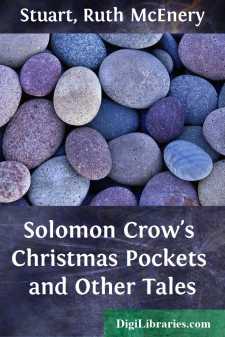Categories
- Antiques & Collectibles 13
- Architecture 36
- Art 48
- Bibles 22
- Biography & Autobiography 813
- Body, Mind & Spirit 142
- Business & Economics 28
- Children's Books 17
- Children's Fiction 14
- Computers 4
- Cooking 94
- Crafts & Hobbies 4
- Drama 346
- Education 46
- Family & Relationships 57
- Fiction 11829
- Games 19
- Gardening 17
- Health & Fitness 34
- History 1377
- House & Home 1
- Humor 147
- Juvenile Fiction 1873
- Juvenile Nonfiction 202
- Language Arts & Disciplines 88
- Law 16
- Literary Collections 686
- Literary Criticism 179
- Mathematics 13
- Medical 41
- Music 40
- Nature 179
- Non-Classifiable 1768
- Performing Arts 7
- Periodicals 1453
- Philosophy 64
- Photography 2
- Poetry 896
- Political Science 203
- Psychology 42
- Reference 154
- Religion 513
- Science 126
- Self-Help 84
- Social Science 81
- Sports & Recreation 34
- Study Aids 3
- Technology & Engineering 59
- Transportation 23
- Travel 463
- True Crime 29
Solomon Crow's Christmas Pockets and Other Tales
Categories:
Description:
Excerpt
SOLOMON CROW'S CHRISTMAS POCKETS
His mother named him Solomon because, when he was a baby, he looked so wise; and then she called him Crow because he was so black. True, she got angry when the boys caught it up, but then it was too late. They knew more about crows than they did about Solomon, and the name suited.
His twin-brother, who died when he was a day old, his mother had called Grundy—just because, as she said, "Solomon an' Grundy b'longs together in de books."
When the wee black boy began to talk, he knew himself equally as Solomon or Crow, and so, when asked his name, he would answer: "Sol'mon Crow," and Solomon Crow he thenceforth became.
Crow was ten years old now, and he was so very black and polished and thin, and had so peaked and bright a face, that no one who had any sense of humor could hear him called Crow without smiling.
Crow's mother, Tempest, had been a worker in her better days, but she had grown fatter and fatter until now she was so lazy and broad that her chief pleasure seemed to be sitting in her front door and gossiping with her neighbors over the fence, or in abusing or praising little Solomon, according to her mood.
Tempest had never been very honest. When, in the old days, she had hired out as cook and carried "her dinner" home at night, the basket on her arm had usually held enough for herself and Crow and a pig and the chickens—with some to give away. She had not meant Crow to understand, but the little fellow was wide awake, and his mother was his pattern.
But this is the boy's story. It seemed best to tell a little about his mother, so that, if he should some time do wrong things, we might all, writer and readers, be patient with him. He had been poorly taught. If we could not trace our honesty back to our mothers, how many of us would love the truth?
Crow's mother loved him very much—she thought. She would knock down any one who even blamed him for anything. Indeed, when things went well, she would sometimes go sound asleep in the door with her fat arm around him—very much as the mother-cat beside her lay half dozing while she licked her baby kitten.
But if Crow was awkward or forgot anything—or didn't bring home money enough—her abuse was worse than any mother-cat's claws.
One of her worst taunts on such occasions was about like this: "Well, you is a low-down nigger, I must say. Nobody, to look at you, would b'lieve you was twin to a angel!"
Or, "How you reckon yo' angel-twin feels ef he's a-lookin' at you now?"
Crow had great reverence for his little lost mate. Indeed, he feared the displeasure of this other self, who, he believed, watched him from the skies, quite as much as the anger of God. Sad to say, the good Lord, whom most children love as a kind, heavenly Father, was to poor little Solomon Crow only a terrible, terrible punisher of wrong, and the little boy trembled at His very name. He seemed to hear God's anger in the thunder or the wind; but in the blue sky, the faithful stars, the opening flowers and singing birds—in all loving-kindness and friendship—he never saw a heavenly Father's love.
He knew that some things were right and others wrong. He knew that it was right to go out and earn dimes to buy the things needed in the cabin, but he equally knew it was wrong to get this money dishonestly. Crow was a very shrewd little boy, and he made money honestly in a number of ways that only a wide-awake boy would think about.
When fig season came, in hot summer-time, he happened to notice that beautiful ripe figs were drying up on the tip-tops of some great trees in a neighboring yard, where a stout old gentleman and his old wife lived alone, and he began to reflect.
"If I could des git a-holt o' some o' dem fine sugar figs dat's a-swivelin' up every day on top o' dem trees, I'd meck a heap o' money peddlin' 'em on de street." And even while he thought this thought he licked his lips....




